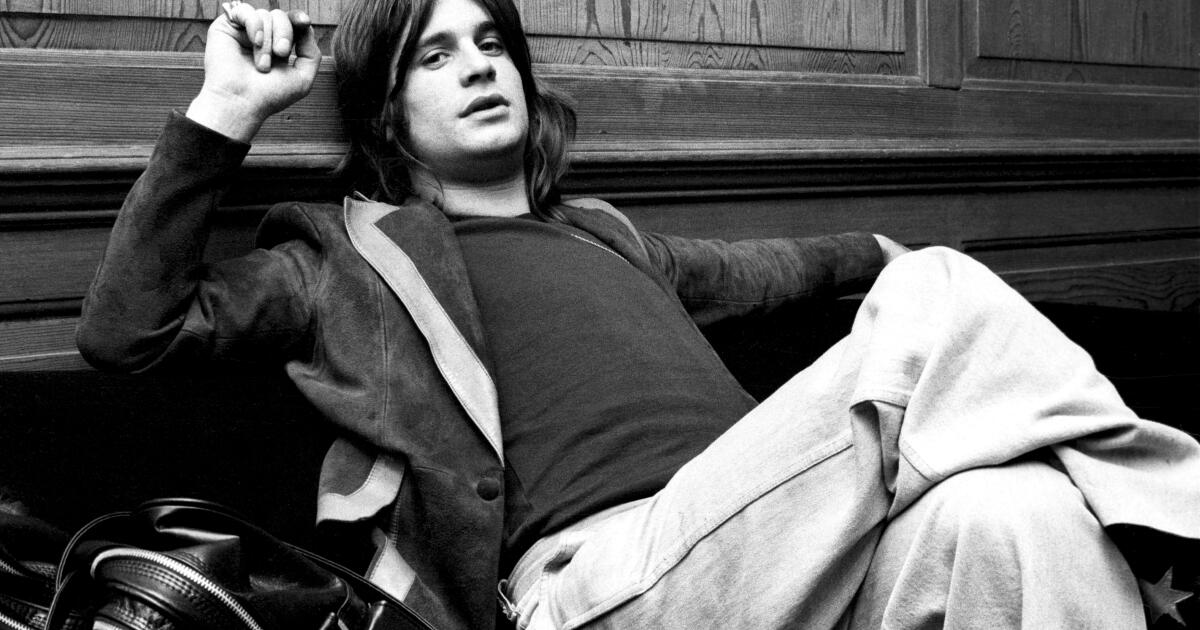A balladeer in the body of a headbanger, Ozzy Osbourne brought soul and emotion to the heavy-metal genre he helped invent as the frontman of Black Sabbath and which he turned into a global force as an outrage-courting solo act. Osbourne, who died Tuesday at 76 — just weeks after he gave what he billed as his final performance in his hometown of Birmingham, England — sold tens of millions of albums, was twice inducted into the Rock & Roll Hall of Fame and late in life found an unlikely second career as a pioneering reality-television star. Here, in the order they were released, are 10 of his essential songs.
Black Sabbath, ‘Paranoid’ (1970)
As heavy as Black Sabbath was, the band could also be remarkably light on its feet, as in the group’s zippy breakout single, which hit No. 4 on the U.K. pop chart. “Paranoid” is narrated by a depressed young man who “can’t see the things that make true happiness,” as Osbourne sings against Tony Iommi’s chugging guitar riff. Yet the song keeps hurtling forward with a kind of dogged determination. Black Sabbath closed with “Paranoid” — current stream count on Spotify: 1.3 billion — at this month’s farewell concert.
Black Sabbath, ‘War Pigs’ (1970)
An antiwar protest song as pointed as John Fogerty’s “Fortunate Son,” “War Pigs” couches its musings on the mendacity of Vietnam’s architects in images of witches and sorcerers poisoning brainwashed minds. The disgust in Osbourne’s sneering vocal is still palpable.
Black Sabbath, ‘Iron Man’ (1970)
Leave it to Osbourne to find the empathy in this bludgeoning yet weirdly tender account of a guy who travels through time to save humanity only to be “turned to steel in the great magnetic field” on his return trip. “Nobody wants him / They just turn their heads,” he sings, “Nobody helps him / Now he has his revenge.”
Black Sabbath, ‘Sweet Leaf’ (1971)
A love song addressed to weed? Osbourne stretches the bit about as far as it can go as Iommi cranks out the sludgy lick that would later be sampled prominently by the Beastie Boys in their “Rhymin & Stealin.”
Black Sabbath, ‘Changes’ (1972)
Osbourne’s most touching vocal performance came in this woebegone piano ballad from Black Sabbath’s fourth album; he sings with so much agony about a romantic breakup that the song doesn’t even bother with guitar or drums. In 2003, Osbourne recut “Changes” as a duet with his then-19-year-old daughter Kelly; a decade later, the soul singer Charles Bradley recorded a wrenching cover not long before he died.
‘Crazy Train’ (1980)
Osbourne got the boot from Black Sabbath in 1979 after his bandmates tired of his drug and alcohol abuse. Yet Osbourne quickly rebounded as a solo act, scoring a Top 10 rock radio hit on his first try with “Crazy Train,” which he wrote and recorded with guitarist Randy Rhoads, who’d left Quiet Riot to join Osbourne’s band. Lyrically, “Crazy Train” contemplates the “millions of people living as foes” amid the Cold War — a dark theme that somehow led to Osbourne’s most euphoric song.
‘Mr. Crowley’ (1980)
To follow up “Crazy Train,” Osbourne and Rhoads — who would tragically die in a plane crash in 1982 while on tour with Osbourne — revived Black Sabbath’s preoccupation with the occult for this midtempo jam about the self-styled prophet Aleister Crowley.
‘No More Tears’ (1991)

Unlike many heavy-metal elders, Osbourne stayed relevant into the grunge era with hits like the bleakly hypnotic title track from his quadruple-platinum “No More Tears” LP, which showcased his close collaboration with guitarist Zakk Wylde.
‘Mama, I’m Coming Home’ (1991)
“No More Tears” yielded another staple of early-’90s MTV in this soaring power ballad that Osbourne and Wylde wrote with Lemmy Kilmister of Motörhead.
Post Malone featuring Ozzy Osbourne and Travis Scott, ‘Take What You Want’ (2019)
At 70, Osbourne surprised many with his robust vocal cameo in this trap-metal pile-up from Post Malone’s smash “Hollywood’s Bleeding” LP. The singer’s collaboration with producer Andrew Watt on “Take What You Want” led to Osbourne’s recruiting Watt to oversee his final two solo albums: 2020’s “Ordinary Man” and 2022’s Grammy-winning “Patient Number 9.”
This story originally appeared on LA Times

